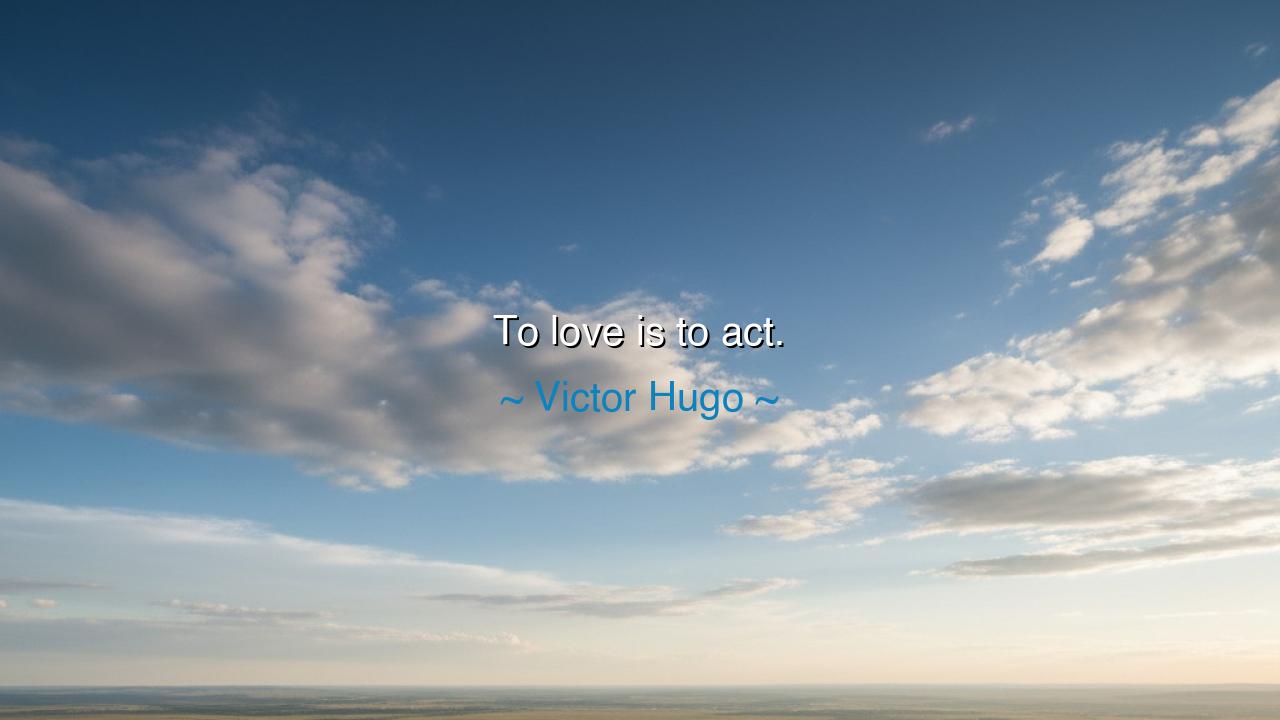
To love is to act.






“To love is to act.” – Victor Hugo
Thus spoke one of the greatest hearts ever to walk among men, a poet whose soul burned with both tenderness and rebellion. In this short, resounding truth, Victor Hugo declares that love is not a dream to be felt, but a deed to be done. To love is not merely to whisper words of affection or to dwell in the warmth of feeling — it is to move, to build, to sacrifice, to create. Love that does not act is a flower that never opens, a song that is never sung. The heartbeat of love, Hugo tells us, is action.
The origin of this idea lies deep within the well of human experience. For Hugo, love was never separate from justice, compassion, or courage. In his novels, especially Les Misérables, love drives every redemption. Jean Valjean’s transformation from a hardened convict into a man of mercy is not born of sweet sentiment but of action — the act of sparing an enemy, of adopting an orphan, of working tirelessly to right the wrongs around him. Love, in Hugo’s world, is the great mover of men; it is what turns despair into hope and chains into freedom. Thus, when he writes “To love is to act,” he defines love as the most sacred expression of will.
The ancients, too, would nod in agreement. To the Greeks, agape — divine love — was a force that compelled service. To the early Christians, faith without works was dead. To the Eastern sages, compassion without deed was illusion. Across all ages, the wise have known that love that does not flow outward with power becomes stagnant within. One may feel affection for humanity, but if one does not lift the hungry, comfort the broken, forgive the enemy — then what is that love worth? Hugo’s words are a reminder that the proof of the heart is in the hands.
Consider the life of Mother Teresa of Calcutta. She did not speak of love as poetry, but as bread shared among the dying, as hands washing the wounds of the forgotten. She said, “We can do no great things, only small things with great love.” Every act of hers — however small — was a flame that dispelled the world’s coldness. She embodied Hugo’s truth: that to love is to move toward suffering, not away from it. It is to translate emotion into mercy, feeling into footprint, devotion into labor. Through her, love became a verb — living, breathing, unstoppable.
Love, when pure, does not seek comfort. It acts even when the body is weary and the soul uncertain. It builds bridges where hatred digs trenches. It forgives when vengeance whispers. It reaches out when pride would turn away. This kind of love is not fragile — it is a warrior’s strength, a builder’s heart, a saint’s fire. It does not wait for permission; it acts because it must, because to do nothing would be to betray the very essence of being human.
And yet, Hugo’s teaching is not reserved for saints alone. It calls to every person who claims to love — a family, a friend, a nation, a cause. To love your child is to guide and protect them even when it hurts. To love your people is to stand for their dignity. To love your planet is to nurture it, not exploit it. To love truth is to defend it in a world of deceit. Love that merely feels and does not do becomes cowardice dressed in beauty. Real love is discipline, not indulgence.
The lesson endures for all time: love without action is illusion. Let your love become motion — a hand that helps, a word that heals, a stand that defends, a silence that forgives. For the measure of love is not in how deeply it is felt, but in how powerfully it changes the world around it. Victor Hugo’s words are not a poem; they are a commandment for the human spirit. So go forth, and let your heart not only feel — let it move. For in every selfless act, the invisible heart of love reveals its immortal face.






AAdministratorAdministrator
Welcome, honored guests. Please leave a comment, we will respond soon